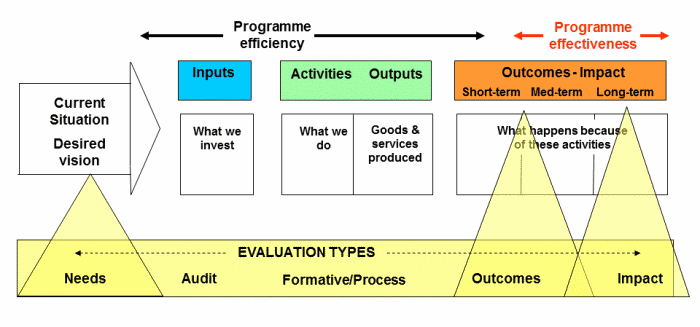Home » Planning & evaluation » Types & questions
Evaluation types and questions
Evaluation types are distinguished by the nature of the questions they attempt to answer. It is important to begin an evaluation by being clear on what is wanted from the evaluation. Projects and programmes involve a number of elements and so many evaluation projects will involve more than one of these types. There are other frameworks which can provide ideas as to the scale and levels of programme intensity to be considered by stakeholders. As the diagram below shows different evaluation approaches can be used to measure different parts of the overall project or change intitiative.

| Figure: A project plan and how different evaluation types and approaches can be used to measure progress through different stages of implementation (Adapted from Taylor-Powell 2008 |
The questions set out here are adapted from the Council on Foundations website.
- Needs Assessments: These evaluations verify and map the extent of a problem. They answer questions about the number and characteristics of the individuals or institutions who would constitute the targets of a program to address the problem. Needs assessments can help design a new program or justify continuation of an existing program.
- Accountability: Monitoring activities produce regular, ongoing information that answers questions about whether a program or project is being implemented as planned, and identifies problems and facilitates their resolution in a timely way.
- Formative evaluations: These evaluations answer questions about how to improve and refine a developing or ongoing program. Formative evaluation usually is undertaken during the initial, or design, phase of a project. However, it also can be helpful for assessing the ongoing activities of an established program. formative evaluation may include process and impact studies. Typically, the findings from formative evaluations are provided as feedback to the programs evaluated.
- Process evaluations: Studies of this kind are directed toward understanding and documenting program implementation. They answer questions about the types and quantities of services delivered, the beneficiaries of those services, the resources used to deliver the services, the practical problems encountered, and the ways such problems were resolved. Information form process evaluations is useful for understanding how program impact and outcome were achieved and for program replication. Process evaluations are usually undertaken for projects that are innovative service delivery models, where the technology and the feasibility of implementation are not well known in advance.
- Impact or Outcome Evaluations: These evaluations assess the effectiveness of a program in producing change. They focus on the difficult questions of what happened to program participants and how much of a difference the program made. Impact or outcome evaluations are undertaken when it is important to know how well a grantee's or foundation's objectives for a program were met, or when a program is an innovative model whose effectiveness has not yet been demonstrated.
- Summative Evaluations: Summative evaluations answer questions about program quality and impact for the purposes of accountability and decision making. They are conducted at a project's or program's end and usually include a synthesis of process and impact or outcome evaluation components.
